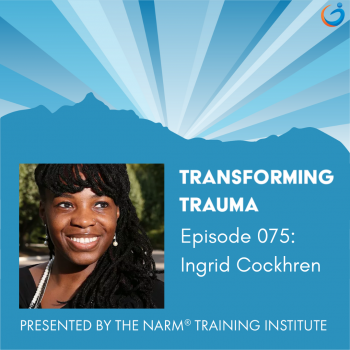Transforming Trauma Episode 075: Understanding Historical Trauma with Ingrid Cockhren
A podcast brought to you by the NARM® Training Institute
In this episode of Transforming Trauma, our host Emily is joined by the CEO of PACEs Connection, Ingrid Cockhren. PACEs Connection is a social network that connects organizations, systems, and communities who are implementing trauma-informed policies and practices, and positive and adverse childhood experience (PACEs) science. Ingrid is currently an adjunct professor specializing in Black psychology, developmental psychology, abnormal psychology and personality theory at Tennessee State University.
Ingrid Cockhren has almost two decades of experience working with children and families and has dedicated her career to educating the public about the connection between adversity and poor health outcomes, including depression, anxiety, criminal behavior and incarceration. Ingrid shares, “the changes to the brain and body when you experience high levels of stress for a long period of time, especially during sensitive periods like childhood, matter.” ACEs, the adverse childhood experiences study, highlighted 10 categories of adversity that are connected to chronic illness and social issues, while PCEs, positive childhood experiences, foster resilience and prevention of adversity. She highlights the “Urban focus” Philadelphia Expanded ACE Study, which brought in an understanding of racism and poverty as ACEs as well.
She shares that her own adverse experience as a survivor of childhood sexual abuse and her work with primarily black incarcerated youth brought her to complex trauma and historical trauma in particular. She entered academia with the question “Why do so many African American children end up in our juvenile justice system?” Considering black parenting styles, scientific colonialism, toxic stress, and intergenerational trauma, she makes the connection between adverse childhood experiences and the implications of historical trauma. Ingrid suggests that the solutions to the systemic issues are systemic as well. “Trauma and stress are baked into our system.”
“As we talk about issues of race and poverty there is a definite push back on this narrative. (…) It has become political because of our past and it actually makes it harder for us to create positive environments in an equitable way.” Her work at PACEs Connection is centered around tracking outcomes of implementing trauma-informed practices within the justice system, healthcare corporations, schools, and governments.
We invite you to listen to the full episode to hear more about Ingrid Cockhren’s work. We are deeply grateful for the opportunity to share a better understanding of nuanced and often polarizing concepts and how it relates to our work in healing complex trauma.
About Ingrid Cockhren:
Ingrid Cockhren graduated from Tennessee State University with a B.S. in psychology and from Vanderbilt University’s Peabody College with a M.Ed. in child studies specializing in minority and impoverished children. Her research areas are African American parenting styles, positive and adverse childhood experiences, historical trauma, intergenerational trauma, brain development, developmental psychology, and epigenetics. Cockhren’s experience includes juvenile justice, family counseling, early childhood education, professional development, consulting, and community education. She is currently an adjunct professor specializing in Black psychology, developmental psychology, abnormal psychology, and personality theory at Tennessee State University.
Learn More

Subscribe for All Episodes
on your Favorite Service:
We want to connect with you!
Facebook @NARMtraining
Twitter @NARMtraining
YouTube
Instagram @thenarmtraininginstitute
Learn more about The NARM Training Institute: http://www.narmtraining.com
Sign up for a free preview of The NARM Inner Circle Online Membership Program: http://www.narmtraining.com/freetrial